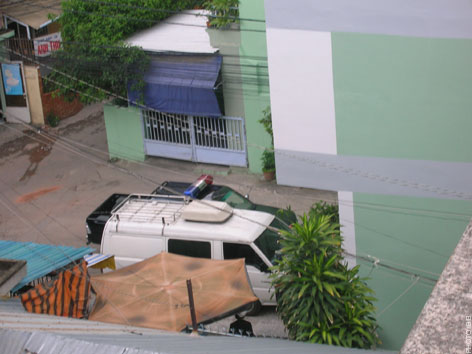PARIS, 3 September 2008 (IBIB) – A delegation of U.S. officials including Ms Katia Bennett, Political Officer of the US Consulate General in Ho Chi Minh City (Saigon) and Laura Carey of the US State Department’s Bureau of Democracy, Human Rights and Labour in Washington DC visited the new UBCV Patriarch Thich Quang Do at the Thanh Minh Zen Monastery in Saigon today (Wednesday 3rd September). The meeting lasted from 2pm to 3.15pm (Vietnam time).
In a phone conversation with IBIB Director Vo Van Ai, Patriarch Thich Quang Do said the delegation asked many questions about the current situation of the UBCV, the government’s attitude during the funeral of late Patriarch Thich Huyen Quang and in its aftermath, and the current status of UBCV monks in Quang Tri, Hue, Da-nang Lam Dong, Saigon and other areas who had suffered harassments and expulsion from their pagodas in the run-up to the Vesak celebrations in May 2008.
Patriarch Thich Quang Do told the US delegation that the late Patriarch Thich Huyen Quang’s funeral had taken place under extreme tension, with important Security forces surrounding the Nguyen Thieu Monastery and local officials trying to seize control of the public address system to make political speeches. However, thanks to strong pressure from international opinion and the determination of over 10,000 Buddhists who braved arrest to attended the funeral, the authorities were forced to step down.
Patriarch Thich Quang Do also stressed that since the funeral, there had been no improvement in religious freedom regarding the UBCV. On the contrary, the government had reinforced controls, surveillance and harassments against UBCV monks, nuns and followers. On 17.8.2008, Security Police prevented Thich Quang Do and other UBCV leaders from travelling to Binh Dinh to celebrate the 49-day memorial service of the late Patriarch’s death. Two days before the event (15.8.2008), Security Police also surrounded Giac Hoa Pagoda, the UBCV’s Secretariat in Saigon, to prevent the UBCV holding a similar ceremony, and particularly to prevent them from making public the late Patriarch’s testament appointing Thich Quang Do as his successor. A Police vehicle with a mobile phone jamming device remained outside Giac Hoa Pagoda (see photo), blocking all communications. Plain-clothed Security Police posted inside Giac Hoa Pagoda took down names of all Buddhists and even feigned to “meditate” for hours before the altar in order to keep permanent watch. Venerable Thich Vien Dinh, Giac Hoa Pagoda’s Superior monk and Secretary,general of the UBCV’s Executive Institute Vien Hoa Dao, managed to travel to Binh Dinh for the 49-day ceremony, but was immediately summoned for interrogations. Local Police accused him of “writing articles on the Internet denigrating the Party”.
 |
|
A Police vehicle with a mobile phone jamming device remained
outside Giac Hoa Pagoda |
UBCV Buddhists in Hue and Da-nang were also prevented from celebrating the 49-day Memorial Ceremony, which happened to fall on Vietnamese “Mother’s Day” (Vu Lan) – a traditional occasion for Buddhists to distribute aid to the poor. Venerable Thich Chi Thang, Thich Chon Niem and UBCV Buddhists in Hue were barred from distributing money and gifts to poor people in the Hue Central Hospital because the gifts were labelled “UBCV”. In Quang Nam-Da Nang, UBCV monk Thich Thanh Quang, head of the UBCV’s local representative board, said that Security Police prevented him from holding a 49-Day Memorial Service for Patriarch Thich Huyen Quang and celebrating Vu Lan at the Giac Minh Pagoda, where he is Superior monk. On 15.8.2008, Security Police blocked all roads leading to Giac Minh Pagoda and prohibited Buddhists from entering. They said the Pagoda was an “illegal establishment”. Several UBCV monks, nuns and members of the UBCV Buddhist Youth Movement were detained and interrogated. Thich Thanh Quang said he was specifically forbidden to read out the Vu Lan Message by Thich Quang Do.
Thich Quang Do urged the US delegation to carefully monitor the ongoing violations of religious freedom in Vietnam, which seriously violate Vietnam’s binding commitments as a State party to UN human rights treaties, especially in its quality as a non-permanent member of the UN Security Council with a responsibility to protect security and peace.
 Quê Me Quê Me: Action for democracy in Vietnam & Vietnam Committee on Human Rights
Quê Me Quê Me: Action for democracy in Vietnam & Vietnam Committee on Human Rights




